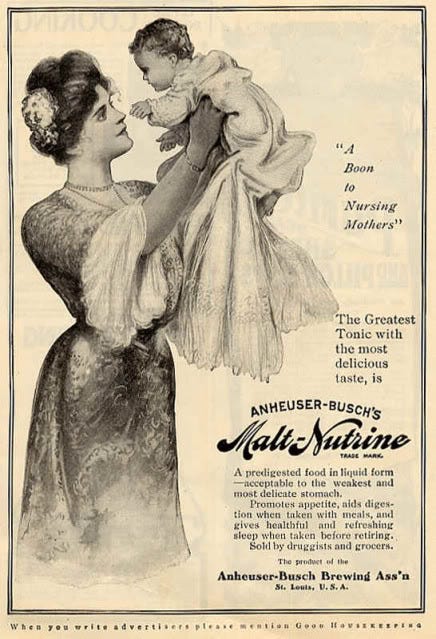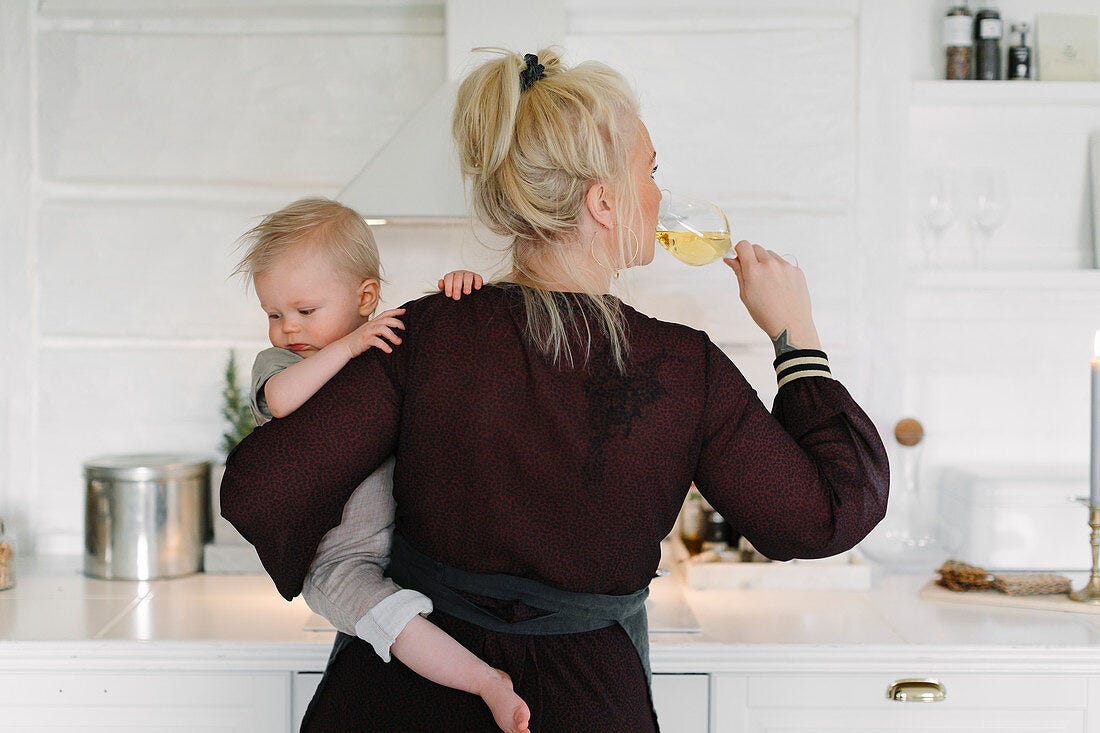Debunking Frothy Folklore

The pediatrician wasn’t wrong, but he wasn’t right either.
According to the findings of principal researcher Dr. Julie Menella, a biopsychologist who works at the Monell Chemical Senses Center in Philadelphia, while the amount of ethanol (alcohol) transmitted to human milk is a minute fraction of that consumed by the mother – proving no, I never did poison my baby, facepalm emoji infinity – infants end up taking in 23% less milk during the [4 hours] after their mother drinks an alcoholic beverage. This is something that breastfeeding women are unable to assess, making them susceptible to lore when their breasts swell with milk and their babies feed more energetically after drinking alcohol.
“Babies are simply compensating for the diminished intake by feeding within the 8–12-hour period following exposure,” explained Dr. Menella in a chapter of Alcohol, Nutrition, and Health Consequences (Humana Press, 2013).
So, who can really blame my friend for thinking a cold Guiness would balloon my breasts with nutrient-dense rivers of white or settle my son’s high-pitched wailing? After all, as Dr. Menella pointed out in her 2001 article in a NIAAA (National Institute on Alcohol Abuse and Alcoholism) publication, these myths are so entrenched in American culture that the U.S. beverage industry once produced low-alcoholic beers for lactating women. Yep, you read that correctly. In 1895, Anheuser-Busch came out with Malt-Nutrine, advertising its nourishment properties for both mother and baby. Dubbed as a “tonic with food value,” it promised restful sleep and strength but was discontinued for its ABV level during Prohibition. And yet here we are in 2024, and folklore persists, like the idea that having a nip or two will calm down a fussy baby or induce sleep due to alcohol’s presumed sedative effect.
In Alcohol, Nutrition, and Health Consequences, Dr. Menella shuts this myth down cold, citing a study that examines the relationship between rates of maternal alcohol consumption with the characteristics of an individual baby which are common during sleep. “They discovered that exposure to alcohol initiates a cascade of events including sleep fragmentation, sleep deprivation, and, in turn, a reduction in spontaneous movements during sleep.”
So, does alcohol provide any benefit to the breastfeeding baby?
“No,” said Kelsi Pinto, RN, BSN, an ER nurse in the Lehigh Valley Health Network. “Hops can promote milk production, but…[you] can drink alcohol-free beer with hops or choose other methods.” The danger with alcohol, explains Pinto, who has been a nurse for 16 years and received her PALS (Pediatric Advanced Life Support) certification in 2015, is that it’s a depressant and can slow down a baby’s breathing and make them sleepy. “Babies already have a fragile and lower respiratory reserve so this would be more worrisome. What we train hard on, as part of resuscitating kids, is oxygenation…it is even more important than in adults because kids have less reserve for oxygen. Alcohol-use can possibly alter oxygenation of a baby – not good!” When the risk of causing respiratory depression and sleepiness in a baby can lead to poor feeding and weight gain, Pinto asks the achingly obvious question, “why drink alcohol?”
Look to the Data, Not the Lore
I thought I was abiding by the rules, but holding that glass to my lips, hearing the swoosh of wine waiting to be imbibed while my baby may or may not be ready for another feeding was starting to feel…wrong, unsafe. Science would tell me to chill out, that lactating women metabolize alcohol differently; alcohol is not stored in breast milk but parallels that found in maternal plasma, decreasing after it peaks approximately one-half hour to an hour after drinking – so just time it correctly, dummy, and don’t go overboard.
But it wouldn’t be until 2023 when the WHO announced that “no level of alcohol is safe” that my question (is this safe to drink or what?) would be unequivocally answered. My youngest is now four-years-old and I’m no longer nursing, but I still find it largely shocking that the guidance and messaging – mainly in the United States – hasn’t changed much and leaves out some key findings that new mothers may want to see highlighted in their discharge packets and on health organization websites worldwide: namely that alcohol is a Group 1 carcinogen linked to several cancers including breast cancer and that no level of alcohol is safe.
I asked the CDC directly if there was any discussion taking place to update the guidance after the WHO’s stunning declaration in ’23, but was only offered a glib statement, informing me that their guidance aligns with the WHO’s guidance related to breastfeeding and alcohol. It’s true, it aligns just fine. But that guidance was published in 2014 – a decade ago. Fortunately, I’m not the only one who feels official guidance in this area could use some fine-tuning.
“It's kind of horrifying to me that so few researchers work on this issue,” said World Nutrition Journal editor-in-chief, Dr. Ted Greiner. “WHO's statement that no amount of alcohol is safe ought to be quoted and explained in any such guidelines for pregnancy, lactation, or any other.” Just this year, Dr. Greiner unpacked the latest literature on alcohol’s effects on breastfeeding in a comprehensive presentation that highlighted current research challenges and the “rock and a hard place” obstacle that policymakers have been facing in this field:
“If warnings against alcohol use are too extreme, we may contribute to some women not breastfeeding or doing it less…if we avoid discussing the issue or ‘paper it over,’ women may have more than they would otherwise or avoid scheduling it.”
His robust review also looked at perpetuated myths, like “pumping and dumping” and drinking coffee influencing alcohol levels in breastmilk. (Spoiler alert: nothing but time eliminates alcohol). Throughout his interpretations of each study, Dr. Greiner exposed a deep and amalgamating need for more evidence-based research on issues related to alcohol. “If we help women to learn about what is known about the impact of alcohol consumption on breastfeeding and on the child, we can empower them to take steps that can reduce those effects.”
Can a Weekly Text Message Encourage Postpartum Moms to Part with Wine?
Dr. Yukiko Washio, a senior research psychologist at RTI International, recently oversaw the first pilot study of a three-month incentive-based text messaging intervention in South Africa aimed at reducing maternal alcohol consumption in pregnant and lactating women. After sending upbeat and informative weekly texts to participants' mobile phones with messages like, “Congratulations on your decision to stay sober during breastfeeding. Drinking while breastfeeding can impact your baby's growth,” there were statistically significant increases in the proportions of participants with alcohol-negative urine tests.
“We realized in our qualitative research that the South African community did not know much about the adverse effects of alcohol-use on infant development when it is happening in close proximity with breastfeeding events,” explained Dr. Washio, who just completed another study in South Africa but targeting alcohol, tobacco, and cannabis abstinence with a similar approach. “Community-wide education on the adverse effects of alcohol use while breastfeeding on infant development is an obvious and important first step in terms of publicly available guideline[s] on breastfeeding…community-based breastfeeding support groups and peer counselors/IBCLCs [International Board Certified Lactation Consultants] can also inform breastfeeding women of this knowledge.”
Dr. Washio’s team is encouraged by their findings, and they should be. I know that had I been asked on discharge day to sign up for weekly text messaging with informative and supportive messages promoting prenatal and postnatal health (including alcohol-use reduction), I would have said, HELL YES! I know in my bones it would have made me think twice before picking up a glass of wine…especially after receiving a text that reads: “Congratulations on your decision to stay sober during breastfeeding, Michelle. Breastfeeding immediately after consuming a drink alters your hormonal response to suckling so your baby will ingest less breast milk. It also disrupts their slumber, growth, and forms alcohol-related memories that may affect behavior later in life.” Yikes. No thanks, man. I’m good.
Would a Unifying International Guideline on Alcohol and Breastfeeding Hurt or Help?
“I’m not going to be the person who tells someone what to do. But are we talking about someone who is having one or two alcoholic beverages every day, maybe more, or are we talking about someone who might drink twice socially in the span of a month or on weekends and at what level?” reflects Ms. Graham on the topic of standardization. “I’m not sure this baby would have been exposed to what this person was drinking. The problem with all of this is, you know, if you’re the WHO, you have to make a big blanket statement that applies to everyone around the entire world but there’s no nuance…whereas if I’m working with an individual then I have that luxury of nuance.”
Ms. Graham and the team of midwives, nurses and lactation specialists at Lifecycle place a large emphasis on education, presenting women with current data-backed research and information to make their own decisions. “I am never going to tell somebody ‘You’re fine. Go breastfeed your baby and have a drink and wait two hours to feed the baby again.’ You would never catch that coming from my mouth because I’m not going to make that decision for somebody.” Instead, she refers mothers to Dr. Thomas Hale’s app, a revered resource by her team that provides up to date information on over 1,300 drugs and vaccines and their lactation risk categories. “We don’t always have the data, [but] we have Dr. Thomas Hale – he’s a Godsend, we worship the man – because he’s done to the best of his ability getting the funding to get good data on pharmacology and breastfeeding and lactation.” In Australia and New Zealand, the Feed Safe app is very popular with moms as it times alcohol clearance from breastmilk. The app uses a woman’s height, weight and alcohol intake to accurately estimate when breastmilk should be free of alcohol, sending her an alert when this time has been reached.
Though the potential harms of lactational ethanol exposure to an infant (i.e. drowsiness, changes in sleep and eating behaviors, and possible long-term neurodevelopment issues) have been documented and widely disseminated, leading drivers of policy like Dr. Elien Rouw, president of the Academy of Breastfeeding Medicine, take a realistic approach in communicating this subject: “…people drink alcohol, that is the fact, and clinical advice must reflect real life, not ideals. The amount of alcohol that reaches the infant is so small, and only a very short period of lifetime, so this will not influence the overall risk for the child. There are several statements in our protocol that caution for excessive use of alcohol, but the authors also make the point that not breastfeeding because of the wish of consuming alcohol may be counterproductive. Both the risks for mother and infant will go up, not only for some cancer types but also for other diseases.
“Interestingly, the WHO statement mentions breast cancer risk specifically with light-moderate drinking (1.5 liters weekly, which is 2 bottles of wine). This is more than the amount of alcohol that is mentioned in the protocol – “occasional, modest amounts.””
[Protocol 21 of the Academy of Breastfeeding Medicine states: Breastfeeding should be avoided after moderate-to-high alcohol consumption. Occasional intake of more modest amounts of alcohol during lactation and waiting 2 hours per drink consumed to resume breastfeeding is likely safe.]
We’ve come a long way from selling women Malt Nutrine. With myriad motherhood apps and breastfeeding support groups available both on and offline, new and soon-to-be mothers have an edge on health management that, less than a decade ago, most women did not have. “The more we learn about alcohol, the more we know there is no real benefit to consuming it,” says Ms. Pinto. “I am not a huge fan of standardization, but in this case, there is absolutely no benefit to drinking alcohol and breastfeeding. I think we should all be our own advocates.”
Quick Question (or two ;) for those who survived the milky trenches and those still in them:
* Did you find the guidance around alcohol consumption confusing during your postpartum breastfeeding period, and how did that affect your decision to imbibe? (Or, if currently nursing, do you find the present guidelines and direction from your healthcare provider clear and helpful?)
* Finally, do you think websites like the CDC and healthcare offices should have the WHO’s ‘23 announcement (and recent facts we’ve since uncovered about alcohol) somewhere highly visible and in bold lettering?
If this article touched you in some way and you’re moved to leave a comment or answer one of the questions above, I’d love to hear from you. If you simply enjoyed learning about a new subject, please feel free to show your support by liking this post, hitting subscribe, or sharing it with a friend. Thank you so much!






Thank you for sharing this important topic. I breastfeeding two children until toddlerhood. I am UK based and found the guidelines not clear. I also went and read the mum pages around the topic and justified my reasons to why it's okay "drop in the Ocean" comment sticks out to me.. but deep down I held a lot of guilt and shame and even 2.5yrs after stopping feeding my youngest, I still feel guilty and shame..I am alcohol free now for almost 11months. I just wish I had this mentality over alcohol then as I do now. My eldest daughter has developmental concerns (cognitive) and epilepsy. I will carry the "what if" guilt with me for life I think.
Regarding the WHO and CDC guidelines. I wish they would put a more up to date guidelines, but also, I can see the point of it putting women off breastfeeding.
Thank you again for bringing this emotive topic up for discussion
Congratulations, Michelle, well done. Enjoyable to read and raises important issues. I especially appreciated the way you consulted so many experts, some of whom I did not know about.
As one can see in my review article (https://worldnutritionjournal.org/index.php/wn/article/view/623/548), some of the most recent research is also the most scary about potential damage, even at the genetic level. As you say, I am quite sad that research on this is so sparse; the issue has hardly gotten attention for a decade or more. My overall comment would be this: the evidence is not strong but as more arrives, it's only going in one direction: alcohol is not safe and may be more harmful that we suspect. As in the case of cancer, only recently discovered. I'm very pleased at the way WHO worded its statement about alcohol and cancer.
Just as with tobacco and even maternal diet, we need to moderate our public health messages (which are a very different animal than messages to one person whose situation we know) to avoid doing harm to breastfeeding per se. But what do we know about the impact of variously worded messages? Almost nothing, an even more shocking research gap. Everyone is just making up messages from thin air with no research backing at all as to what effect it might have either on breastfeeding OR on alcohol consumption.
I did do one study on it in South Korea (https://worldnutritionjournal.org/index.php/wn/article/view/637/565) which suggested that even a hard "don't drink alcohol if breastfeeding" message did not discourage young women from planning to breastfeed. But a lot more research like that is needed in different cultural settings.